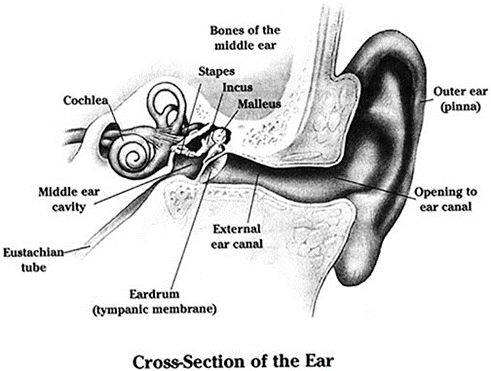Disclaimer [ENGLISH]
Disclaimer : This material is for educational purposes only. You, the reader, as
Definition
- Ear congestion is a stuffy or plugged up feeling in the ear.
- Some children complain of hearing crackling or popping noises in the ear.
- Hearing is often muffled.
Health Information
Causes

- Blockage of the ear tube (eustachian tube).
- This is usually from nasal allergies or a cold.
- Blowing the nose too much can also cause blockage of the ear tube.
- Sudden increases in air pressure. This can occur in descent (coming down) when mountain driving or flying.
Prevention During Air or Mountain Travel
- It’s safe to fly when your child has a cold.
- Most symptoms happen when the airplane is coming down in altitude. This is the descent of the plane during the 15 minutes before landing.
- Keep your child awake during takeoff and descent.
- Swallow during descent using fluids or a pacifier.
- Children over age 6 can chew gum during descent.
- Yawning during descent also can open the middle ear.
- Drink lots of fluids throughout the flight. This will prevent the nasal secretions from drying out.
Care Advice
-
Swallow and Chew More:
- Have your child drink while their nose is pinched closed.
- Children over the age of 6, can also use chewing gum.
-
Decongestant Nose Spray (Age 12 years or older): Discuss with your child’s healthcare provider prior to starting these (or other) medications
- If chewing doesn’t help after 1 or 2 hours, use a long-acting decongestant nose spray. You can ask your pharmacist to suggest a brand.
- Dose: 1 spay per side, 2 times per day as needed.
- Don’t use for more than 3 days. Using this for too long can cause worsening of your child’s symptoms.
- Decongestants given by mouth (such as Sudafed) are not advised.
-
Allergy Medicines: Discuss with your child’s healthcare provider prior to starting these (or other) medications
- Nose allergies can cause ear stuffiness.
- Giving your child an antihistamine once daily can help.
- A nasal steroid spray used once daily can help decrease inflammation in the nose and causes the eustachian tubes to open up.
- It make take several weeks of using medications to see a change.
Call Your Doctor If
- Your child complains of ear pain.
- There is discharge or bleeding from your child’s ear.
- Your child has fever.
- You think your child needs to be seen.
- Your child becomes worse.
This publication was adapted from information within American Academy of Pediatrics Patient Education Handouts
Reviewed by: AR D.O. | 06/2023


